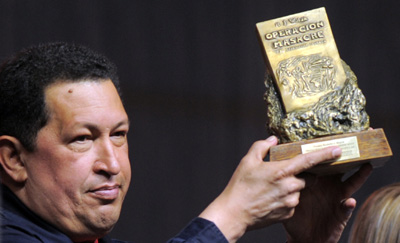Attacks on the Press in 2011: State Media As Anti-Media Tool
In some Latin American countries, state-owned media are used not only for propaganda but as platforms to smear critics, including journalists. Some elected leaders have even invested in large multimedia holdings to further their agendas. By Carlos Lauría
Attacks on the Press in 2011: Venezuela
President Hugo Chávez Frías’ administration continued its systematic campaign to stifle critical reporting through regulatory, judicial, and legislative avenues. The telecommunications regulator fined Globovisión, the country’s sole critical television station, more than US$2 million for its coverage of deadly prison riots in June and July. The regulator invoked the Law on Social Responsibility in Radio…
Venezuelan weekly reopens, executives still charged
New York, August 30, 2011–The Committee to Protect Journalists is concerned by ongoing criminal cases against two executives from the Venezuelan newspaper 6to Poder, but welcomes a judge’s decision to allow the weekly to resume publishing. The paper’s owner and a top executive were charged last week with inciting hatred, insulting a public official, and…
Venezuelan newspaper shut, executives charged
New York, August 24, 2011–The Committee to Protect Journalists condemns the closure of the Venezuelan newspaper 6to Poder after a judge ruled on Monday that the weekly cease distribution. The newspaper’s owner and a top executive were charged with incitement to hatred, insulting a public official, and publicly denigrating women after the paper published a…
Newspaper columnist shot to death in Venezuela
New York, May 20, 2011–Wilfred Iván Ojeda, a Venezuelan newspaper columnist and politician, was shot to death on Tuesday in the city of La Victoria, Aragua state, according to press reports. The Committee to Protect Journalists urged authorities today to fully investigate the murder and bring all those responsible to justice.

Hugo Chávez, free expression prize winner
Just as the awardee himself anticipated (in his subconscious, after all, he is no idiot), this “freedom of expression award” stirred up disapproval and indignation across the board. Notwithstanding, no one should question the decision of Argentina’s University of La Plata. If anyone has freedom of expression in Venezuela, it’s the prize-winner: He talks and…
Attacks on the Press 2010: Americas Analysis
In Latin America, A Return of Censorship By Carlos Lauría As the preeminent political family in the northeastern state of Maranhão for more than 40 years, the Sarneys are used to getting their way in Brazilian civic life. So when the leading national daily O Estado de S. Paulo published allegations in June 2009 that linked José…
Attacks on the Press 2010: Venezuela
Top Developments • Censorship spikes: RCTV banished again, newspapers barred from using crime images. • New laws restrict Internet content, tighten control over broadcast licenses. Key Statistic 1,300: Hours of presidential speeches that were aired between 1999 and 2010. Using all the tools of power, President Hugo Chávez Frías continued his aggressive campaign to silence…
